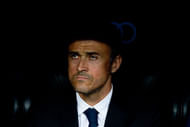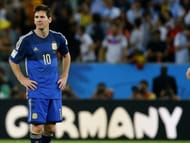The reader may well wonder why I am obtuse enough to add the word “Barcelona’s” to describe our protagonist. Who is he, if not Barcelona’s Lionel Messi? For while “Argentina’s” Lionel Messi has been under attack for years, the little man we see striding out in the famed stripes of the Blaugrana has been an altogether different animal.
Even so, the whispers, growing ever-so-imperceptibly since the departure of Pep Guardiola, have now grown into a crescendo under the Asturian Luis Enrique.
‘Messi does not deserve to be one of the final three nominees for the Ballon d’Or!’ What a world we live in.
Guardiola’s golden boy
That Lionel Messi has become a victim of the absurdly high standards he has set for himself is pointedly obvious. The wildly successful reign under Guardiola was destined to end sooner or later. The Spaniard himself acknowledged that he was always on the lookout for signs that his team was beginning to slouch on their pedestal atop the footballing world.
And when he saw, in his own words – “the light go out of my players’ eyes” – Pep decided it was time for a fresh challenge, both for himself and his charges.
The man understood that football was no exception to the Darwinian theory of evolution – that change was not only necessary, but welcome.
The Gerardo Martino experiment
Messi himself has grown to understand this – we have seen the Argentinian put in credible shifts on the right wing in Martino’s lone season in charge.
The humiliation of Barcelona’s destruction at the hands of Bayern Munich in the Champions League the previous year had had a marked influence on the proud Messi. And he was beginning to embrace the possibility that change was the need of the hour.
His compatriot tried to instigate a little more directness into Barcelona’s tried and tested recipe and ended up being derided the world over for tampering with Barcelona’s “traditions”.
Ironically, the current boss himself was lauded for bringing in a direct and very effective Ivan Rakitic into the scheme of things at the Camp Nou this time around.
Luis Enrique’s start to the season
This season the world has crooned at Messi taking up the mantle of playmaker-in-chief, now that Xavi’s days at the top look numbered. The arrivals of Neymar and Luis Suarez in successive seasons have convinced new manager Enrique that the team requires their Number 10 to play like one.
Drifting into positions in that languid, easy manner reminiscent of the calm before the storm, a Messi in possession of the ball has been irresistible this season – his eye for the killer pass absolutely devastating. His vastly improved chemistry with Neymar has seen the duo steamroll oppositions without appearing to breaking a sweat.
Where, then, has all the criticism come from?
Delving into the two fixtures that have prompted cries of crisis – and by extension, a wave of indifference to Messi himself – may provide us with answers.
The big-game conundrum – PSG and El Clasico
Barcelona have looked woefully out of tune when the stakes have been high this year. Most unusually for a Barcelona side, it is their midfield that has let them down in these crucial encounters.
The Champions League encounter against Paris Saint-Germain at the Parc des Princes saw Messi score almost immediately in response to David Luiz’s early goal. But the home team’s robust midfield trio of Marco Veratti, Blaise Matuidi and Thiago Motta proceeded to outmuscle their Barcelona counterparts. They frequently broke up play and maintained a discipline that saw the forward three increasingly isolated from the midfield.
This was once again on view in the Clasico, with Luis Enrique’s restoration of the famed midfield trio that has defined Barcelona for so long lacking any of the penetration of old. Sergio Busquets looks like a shadow of his former self while Andres Iniesta’s quality has not shone through as often as one would expect. That Xavi can no longer stitch the whole canvas together has become increasingly apparent.
Ivan Rakitic has been a lone warrior, taking on all comers with typical gusto. This may have been the reason for his sudden drop in performance in the lead-up to the showdown at the Santiago Bernabeu. It certainly influenced Enrique’s surprising decision to start with Xavi against Real Madrid.
Harsh realities
It may seem like I’m looking to shift the blame to just about every other quarter, absolving Messi himself of any responsibility. But this is merely an attempt to show that these two matches have been but isolated incidents; an improper understanding of the way the Argentine functions.
If the World Cup in Brazil has taught us anything, it is that Messi is not Diego Maradona. He is not one to drag out gritty performances from a misfiring team – and even in that role he almost attained the ultimate prize in world football.
That is not to say that Messi was the only one who had a voice in Argentina’s run to the final. That Argentinian team, much like Barcelona today, were unable to produce the kind of football we expect from champion teams on the big occasion. All this despite possessing a wealth of top-heavy attacking talent rivalled by few others in world football – reminiscent of the current Barcelona team.
Put the Little Flea in a system that performs the roles expected of it and he will do what perhaps no other player in world football is capable of. The only one who can challenge that notion is that model professional Cristiano Ronaldo, who himself is reaping the benefits of Carlo Ancelotti’s calm and understated genius.
There is no one-size-fits-all approach to success in football. Ancelotti’s brilliance in delivering the long awaited La Decima is a prime example, especially now that he has found a way to cope with the losses of two heartbeats of that team – Angel Di Maria and Xabi Alonso.
That is what Luis Enrique will hope to accomplish; create a system that maximises the attacking potential at his disposal. He seems to be well on his way. Although, admittedly, he could do better than making decisions like the one to start the impressive centre half Jeremy Mathieu at left back in the Clasico.
It is these little things, and a million other implausibles, that change fortunes. How did the Argentinian captain miss this quite glorious chance on that all-important night in Rio?
A difficult finish, yes – but one that had Messi’s signature all over it. The less that is said about the missed free-kick later on that night, the better it is for all our sakes. And that is what he has done – raised the bar so high that even a jump beyond most mortals in the footballing universe is blown out of proportion.
Stay calm, mortals. The only way Lionel Messi is not one of the top three players in the world is if, as Eden Hazard has suggested recently, we consider Ronaldo and Messi to be “extra-terrestrials”.
Last of all, a special mention to the late Tito Vilanova, whose title-winning reign I did not mention, having talked of both his predecessor, and successors. It was not strictly relevant to the Messi we see trying to adapt to a changing Barcelona.
In the lead-up to the title-decider against Atletico Madrid last year, Messi himself had spoken of his desire to honour the man taken before his time with a title win. Rest assured, it will be burning the flame a little bit brighter in the sentimental Argentine.
And that is far more valuable to him than a fifth Ballon d’Or on his cabinet wall.



